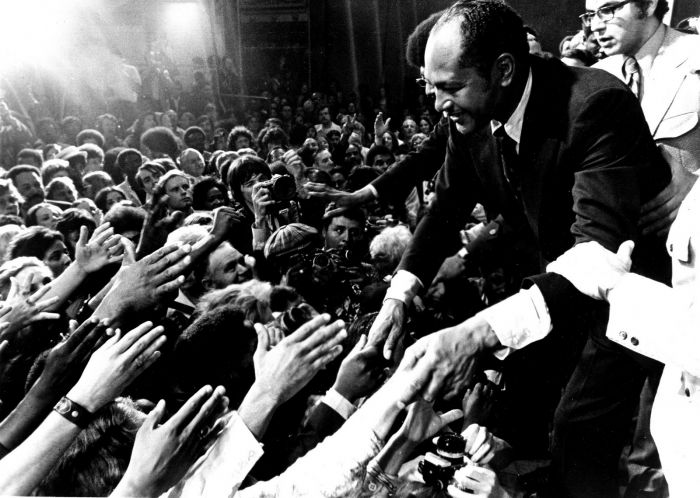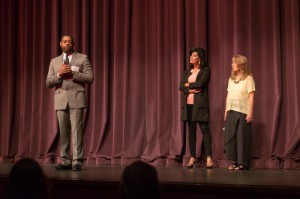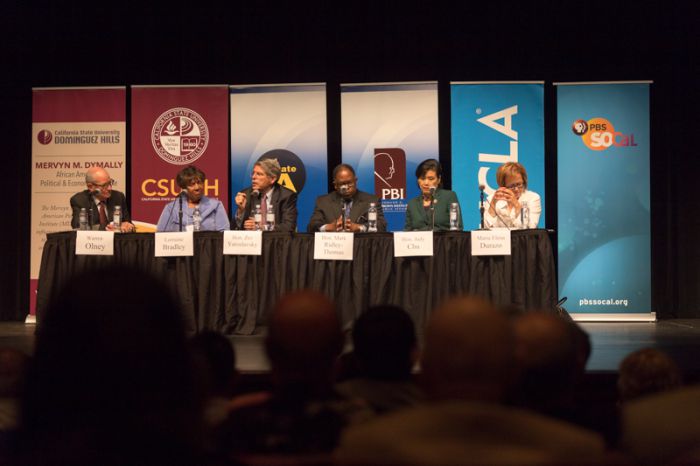
Approximately 10 million passengers travel through Los Angeles International Airport’s Tom Bradley International Terminal every year, yet many of them have no idea who the terminal’s namesake is. The longest-serving mayor in city of Los Angeles history–and its only African American mayor–who paved the way for other candidates crossing racial boundaries at the polls, has very little acknowledgement outside of the city, but Lyn Goldfarb and Alison Sotomayor are looking to change that.
In 2007, filmmakers Goldfarb and Sotomayor, noticing that Bradley’s story was not taught in the public school system and fearing that his legacy was being forgotten, began work on “Bridging the Divide: Tom Bradley and the Politics of Race.“ The documentary made its public debut to a full house at the Luckman Theater at Cal State L.A. on Aug. 10. California State University, Dominguez Hills and its Mervyn M. Dymally African American Political and Economic Institute were co-sponsors of the screening as part of the university’s yearlong schedule of events commemorating the 50th anniversary of the Watts Rebellion and examining its impact on the Civil Rights Movement.

A former L.A. police officer who was an L.A. city councilman in 1965, Bradley was a vocal critic of the treatment of minorities in the city. “Bridging the Divide” begins with footage from the rebellion and goes on to showcase Bradley’s legacy in context with the obstacles he experienced as a black politician in the 1960s, 70s and 80s.
As the first African American to serve as mayor of Los Angeles, Bradley was also the first African American mayor in the United States to win the seat in a predominately white city. His tactics are heralded to have paved the way for other notable politicians such as President Barack Obama.
“Tonight was the fulfillment of a dream, the impossible dream,” said Bradley in his 1973 election night speech. “The victory which has come tonight is not just a victory for Tom Bradley, not just a victory for the campaign, but a victory for progress, a victory for our children.”
Bradley had originally run for mayor in 1969, a race in which incumbent Mayor Sam Yorty ran on a racial smear platform. Yorty publicly claimed that Bradley was working with “black militants” and “communists” who would take over city hall should he win. The campaign worked and Yorty took another four years before Bradley was able to unseat him as mayor.
During his time in office, Bradley helped to reform the Los Angeles Police Department, diversified the hiring of city hall, campaigned for and hosted the 1984 Summer Olympics, oversaw the city during the riots that followed the Rodney King trial verdict, broke ground on the Metro Rail transit system and shaped the landscape of present Los Angeles.
“If you look at images of the city of Los Angeles when he comes [into office] in 1973 and look at images of the city when he left, the landscape of this metropolis was built by Tom Bradley,” said Christopher Jimenez y West, assistant professor of history at Pasadena City College and member of the film’s advisory board, during a short speech after the premiere.

Following the film, KRCW “Which Way LA” host Warren Olney moderated a panel of individuals who had direct contact with Bradley, including; Bradley’s eldest daughter Lorraine Bradley, Congresswoman Judy Chu, Maria Elena Durazo of UNITE HERE! and the Miguel Contreras Education Foundation, Los Angeles County Supervisor Mark Ridley-Thomas, and former L.A. County Supervisor Zev Yaroslavsky. The panelists shared stories of Bradley in his moments away from public view, including his love of shopping and his devastation from losing the gubernatorial race.
“Daddy was one of those people who would listen to everybody. Whether he appreciated your opinion or agreed with your opinion, didn’t make any difference,” said Lorraine Bradley, “he’d still listen to you.”
The panel also mentioned many members of the audience who had ties to Bradley. Attendees included many current and former city councilmembers, and other notable local politicians, many of whom have careers shaped by Bradley’s time in office.
Though more than 15 years have passed since Bradley’s death, his legacy is still clearly visible both politically and physically.
“His career so deeply shaped our view of how and why we must bridge the divides that separate us,” said William Covino, president of Cal State Los Angeles, whose Pat Brown Institute for Public Affairs hosted the film screening in conjunction with PBS SoCal, UCLA, and CSUDH. “Tom Bradley and his leadership helped L.A. grow into the great city that we all care for so deeply.”
“Bridging the Divide: Tom Bradley and the Politics of Race” will premiere on PBS SoCaL at 8 p.m., August 18.